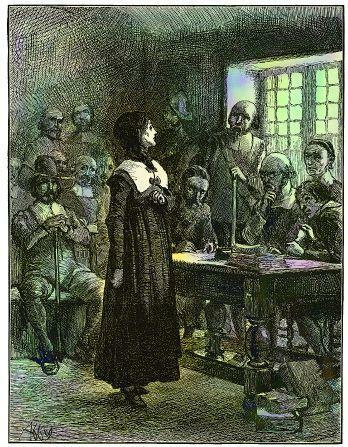Anne Hutchinson
One of the most famous religious dissenters in seventeenth-century colonial North America (at the beginning of the British colonisation) was a woman named Anne Hutchinson (born Anne Marbury). Hutchinson migrated from England to Boston, Massachusetts in 1634 with her husband and 10 children. The daughter of a minister, she started to gather people around her and to preach herself, which was quite unusual at the time. She soon became very critical of the ministers there. She felt that her ideas came to her from God, directly – ‘by an immediate voice’, as she said it herself. That sounded dangerous and weird at the time. Because of her radical ideas, she was put on trial. People at the time commonly believed that women should be obedient and were not able to make their own judgments, but Hutchinson mounted her own defence herself very effectively. She proved very well versed in theology and denied that the court had any right to judge her, as she was following God’s inspiration She even threatened the court:
‘Therefore take heed how you proceed against me—for I know that, for this you go about to do to me, God will ruin you and your posterity and this whole state.’
The all-male court in 1636 excommunicated and banished her nevertheless. She moved to the area of Rhode Island with some other people. There she met a kindred spirit, Roger Williams (see the clippings about Rhode Island and Roger Williams), although they may have known each other already. Their ideas about the separation between church and state were similar. Hutchinson did not stay in Rhode Island, though; after the death of her husband, she travelled to the Dutch colony of New Netherlands, where she was eventually killed by Native Americans.
In the 1620s a group of rigorous Protestants, called Puritans, settled in the region of Massachusetts (in North-east America). They intended to live according to their strict interpretation of Christianity and did not accept dissidence. Rhode Island in contrast was established by Roger Williams, also a devout Christian but one with some extraordinary radical ideas. Under his inspiration, Rhode Island granted freedom of religion to all (see all clippings on the Charter of Rhode Island and Roger Williams).
Anne Hutchinson became an iconic figure in American history, heralded as a prophet and advocate of the fight for religious freedom, the separation of church and state, equality and women’s rights, and against all forms of abuse of authority and power.
Why might have the ideas of Hutchinson been viewed as dangerous? Why would she become heralded as a prophet and advocate of the fight for religious freedom, the separation of church and state, equality and women’s rights, and against all forms of abuse of authority and power? How would you react if a woman advanced some unusual ideas?

